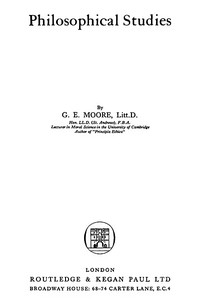Philosophical Studies by G. E. Moore
"Philosophical Studies" by G. E. Moore is a philosophical work written in the early 20th century. The book is a collection of essays exploring various principles of philosophy, particularly focusing on topics such as Idealism, perception, and the nature of reality. It critically examines prominent philosophical arguments, making it an insightful read for those interested in abstract thought and the foundations of philosophical inquiry. At the start of the collection, Moore introduces
the theme of the refutation of Idealism, asserting that the belief that reality is wholly spiritual is built on a range of arguments that deserve scrutiny. He sets out to challenge the proposition "esse is percipi" (to be is to be perceived), indicating that this claim is central to Idealistic arguments. By rigorously dissecting this assertion, Moore aims to demonstrate its insufficiency to support the broader Idealist conclusion that reality is spiritual, suggesting that much of contemporary philosophy, including Agnosticism and Sensationalism, may rest on this flawed foundation. (This is an automatically generated summary.)
Read now or download (free!)
| Choose how to read this book | Url | Size | ||||
|---|---|---|---|---|---|---|
| Read online (web) | https://sendtokindle.compellingsciencefiction.com/ebooks/50141.html.images | 715 kB | ||||
| EPUB3 (E-readers incl. Send-to-Kindle) | https://sendtokindle.compellingsciencefiction.com/ebooks/50141.epub3.images | 275 kB |
Send
to kindle email: |
|||
| EPUB (no images, older E-readers) | https://sendtokindle.compellingsciencefiction.com/ebooks/50141.epub.noimages | 280 kB | ||||
| Kindle | https://sendtokindle.compellingsciencefiction.com/ebooks/50141.kf8.images | 473 kB | ||||
| older Kindles | https://sendtokindle.compellingsciencefiction.com/ebooks/50141.kindle.images | 398 kB | ||||
| Plain Text UTF-8 | https://sendtokindle.compellingsciencefiction.com/ebooks/50141.txt.utf-8 | 649 kB | ||||
| Download HTML (zip) | https://www.gutenberg.org/cache/epub/50141/pg50141-h.zip | 244 kB | ||||
| There may be more files related to this item. | ||||||
Similar Books
About this eBook
| Author | Moore, G. E. (George Edward), 1873-1958 |
|---|---|
| Title | Philosophical Studies |
| Note | Reading ease score: 54.6 (10th to 12th grade). Somewhat difficult to read. |
| Contents | The refutation of idealism -- The nature and reality of objects of perception -- William James' "Pragmatism" -- Hume's philosophy -- The status of sense-data -- The conception of reality -- Some judgments of perception -- The conception of intrinsic value -- External and internal relations -- The nature of moral philosophy. |
| Credits | Produced by Marc D'Hooghe (Images generously made available by the Hathi Trust.) |
| Language | English |
| LoC Class | B: Philosophy, Psychology, Religion |
| Subject | Philosophy |
| Subject | Philosophy, Modern |
| Category | Text |
| EBook-No. | 50141 |
| Release Date | Oct 6, 2015 |
| Most Recently Updated | Apr 2, 2024 |
| Copyright Status | Public domain in the USA. |
| Downloads | 227 downloads in the last 30 days. |
| Project Gutenberg eBooks are always free! | |

